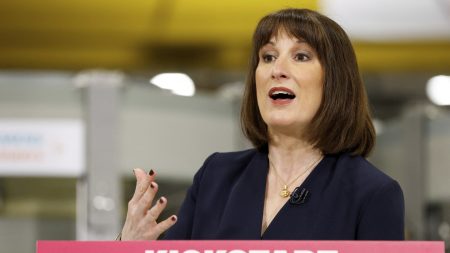Germany’s Economic Growth Forecast Slashed Amid Ongoing Challenges
The German government has significantly lowered its economic growth forecast for 2025, predicting a meager 0.3% expansion, down from its previous estimate of 1.1% issued in October. This revision reflects the ongoing struggles of Europe’s largest economy, which has grappled with stagnant growth for the past four years. The country’s gross domestic product (GDP) contracted by 0.2% in 2023 and an additional 0.3% last year, marking two consecutive years of economic decline. These figures underscore the profound challenges Germany faces in navigating global economic shifts and addressing its own structural weaknesses. The economy has become a central issue in the run-up to the early parliamentary election scheduled for February 23, 2024, which was called seven months ahead of schedule following the collapse of Chancellor Olaf Scholz’s three-party coalition in November. The coalition fell apart amid disagreements over how to revitalize the economy, highlighting the urgency of finding a path to recovery.
Contrasting Proposals for Economic Revival
As the election approaches, contenders for leadership have put forward differing strategies to reboot Germany’s stagnating economy. Vice Chancellor and Economy Minister Robert Habeck acknowledged the severity of the situation, stating that the global crises of recent years, including the energy crunch triggered by Russia’s invasion of Ukraine, have disproportionately impacted Germany’s industry- and export-heavy economy. While the country managed to avert the worst of the energy crisis and saw inflation decline, Habeck emphasized that deeper structural issues are now coming to the forefront. These include a shortage of skilled workers, bureaucratic inefficiencies, and weak investment—both public and private. Habeck also pointed to the current uncertainty surrounding U.S. economic and trade policy, as well as the post-election direction of Germany, as factors dampening investor and consumer confidence.
Industry Leaders Sound the Alarm on Economic Prospects
Germany’s main industry lobby group, the Federation of German Industries (BDI), painted an even bleaker picture of the economy’s near-term prospects. In its latest forecast, the BDI predicted that Germany’s GDP will shrink by 0.1% this year, further deepening the economic malaise. BDI head Peter Leibinger criticized years of delayed reforms and underinvestment by previous governments, arguing that these failures have left the economy ill-equipped to respond to current challenges. Leibinger’s remarks echo Habeck’s assessment of structural weaknesses and suggest that the path to recovery will require more than short-term measures. Instead, the country must address long-standing issues, such as the skilled labor shortage and bureaucratic hurdles, to create a more favorable business environment and stimulate growth.
Structural Challenges Hindering Recovery
The German economy’s struggles are rooted in a combination of global and domestic factors. As Habeck noted, the country’s reliance on industry and exports has made it particularly vulnerable to external shocks, such as supply chain disruptions and shifts in global trade patterns. At the same time, domestic structural issues have compounded these challenges. The shortage of skilled labor, for instance, has become increasingly acute, with many industries struggling to find qualified workers to fill critical roles. This gap has been exacerbated by an aging population and a mismatch between the skills being taught in schools and the demands of the modern workforce. Additionally, the country’s bureaucratic processes and weak investment in both public and private sectors have hindered innovation and infrastructure development, further stifling economic growth.
The Road Ahead for Germany’s Economy
Despite the gloomy outlook, there is hope for Germany’s economic future. The upcoming election presents an opportunity for the next government to take bold action and implement the reforms needed to address the country’s structural challenges. Candidates have proposed a range of measures, from streamlining regulatory processes to increasing investment in education and infrastructure, aimed at revitalizing the economy. However, the success of these efforts will depend on the ability of the next government to build consensus and take decisive action. As Habeck and industry leaders have made clear, the current uncertainty surrounding both global and domestic developments must be addressed to restore confidence among investors and consumers.
Conclusion: A Pivotal Moment for Germany’s Economic Future
Germany’s economy is at a crossroads, with the upcoming election offering a chance to chart a new course. The slashed growth forecast and contracting GDP underscore the urgency of the situation, but they also highlight the potential for meaningful change. While the challenges ahead are significant, from addressing structural weaknesses to navigating global economic uncertainty, there is an opportunity to lay the groundwork for sustainable and inclusive growth. The next government will play a pivotal role in shaping Germany’s economic future, and its success will depend on its ability to rise to the occasion and deliver the reforms and investments needed to ensure long-term prosperity.








